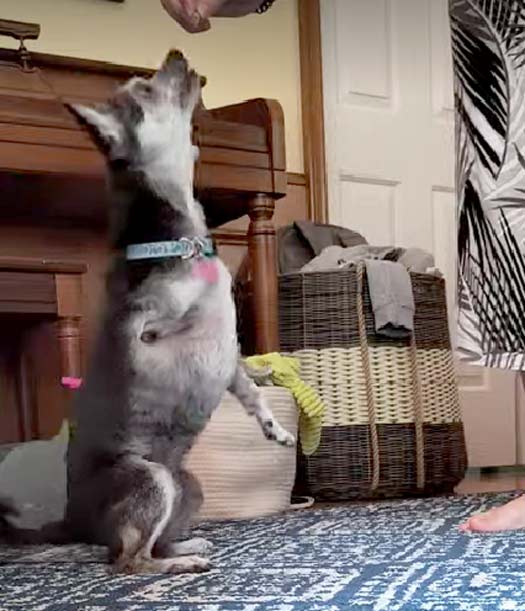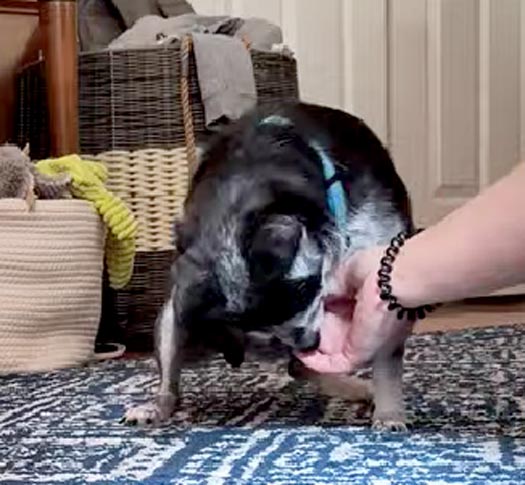Front leg Tripawd Poochie benefits from free canine rehab evaluation and at-home therapy thanks to Tripawds Foundation Rehab Grant #190. The consultation, and rehab exercises help Boon stay strong and love life on three legs. Read his story, and learn how you can get a free veterinary rehab evaluation for your dog or cat.
Yes! Tri-kitties qualify for free feline rehab too. See all Tripawds who have received free rehab sessions thanks to your support.
Help Keep This Program Going!
Tripawd Poochie Benevides is a rescued front leg amputee chihuahua of unknown age, probably 10-12 years old. She was adopted as a tripawd, with a front right amputation, although her tripawd status was not the major concern – her mange, systemic yeast infection, eye problems, and dental issues were the primary concerns upon adoption. She was a sorry sight. We sought information about a rehabilitation veterinarian and information about Tripawds in early 2024 via Google and found the Tripawds blog because we noticed that she would refuse to go for a walk or would walk for shorter distances before wanting to turn around and go home, and was not as mobile around the house. She stopped doing a ‘dance’ when her food was ready and was more lethargic. We were worried about her mobility and joints. I was excited to find the links to qualified rehab vets. I didn’t know there was such a thing as a rehabilitation vet!
We scheduled a visit with Dr. Kathy Fowler, CCRP, at Climbing Rose Vet in Athens, Georgia. Our consultation revealed that Tripawd Poochie has good range of motion of her neck and limbs. Poochie did not appear to be in pain when testing her joints. Her posture when sitting and standing was in a crouched position, suggesting that her hip flexors might be tight. Dr. Fowler also found that her lumbar spine was slightly out of alignment. She also had large tricep and pectoralis muscles in the left front, which is expected due to that limb taking a significant amount of force when she hops around.

Canine Rehab Program for Tripawd Poochie
Dr. Fowler gave Poochie a variety of exercises, including: hind-leg stands (5 sec x 3, 1-2 times/day working up to 20-30 sec), sit-to-stand exercises (10 reps, 1-2 times a day), and backward walking exercises (3-5 steps back, 5 times, 1-2 times/day) all with the goal to strengthen her hind limbs and use her extensor muscles. We also have stretching activities (e.g., when she wants a belly rub, we are to try to passively apply a bit of stretch to the rear limbs to extend them), and light massage of her left front pectoralis and triceps. Our house has a pool and we asked Dr. Fowler how to safely use the pool for rehab with a Ruffwear Float Coat. Dr. Fowler encouraged us to slowly introduce Poochie for only 2-3 minutes a session, working up to 7 minutes with support and supervision.

I was most surprised that potentially Poochie’s change in her mobility was possibly psychological rather than physiological. We had an older chihuahua, Razzmatazz, who suddenly died of congestive heart failure three months ago, and so Dr. Fowler thought we should rule out anxiety or psychological reasons for mobility changes in Poochie. Dr. Fowler considered our whole dog health, which involves not just the physical but the mental aspects of care, which made us happy. We wonder if Poochie’s old playmate helped her be more mobile– and possibly now she has a hard time being motivated to go outside, play, or go for a walk. I think all pet owners, but particularly tripawd pet owners, should consider how other animals can encourage healthy movement and activity in addition to the benefits of knowing how to assist with rehabilitation, stretching, and maintaining joint and muscle health with targeted exercises.
~ Teal and Poochie
How to Find a Rehab Therapy for Tripawd Dogs and Cats
At Home Front Limb Tripawd Rehab Program
